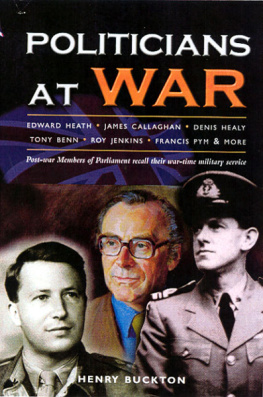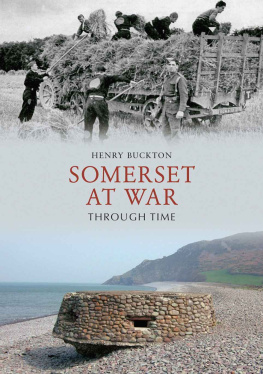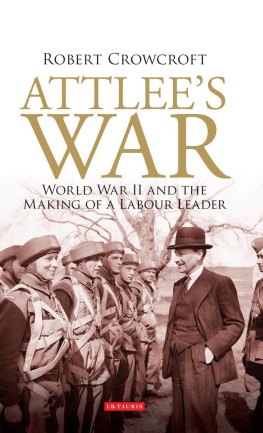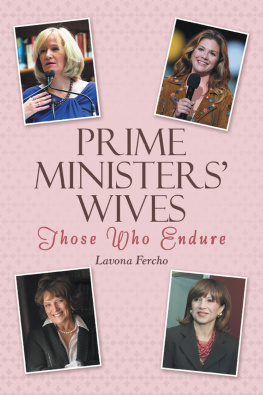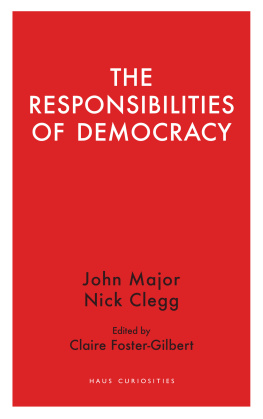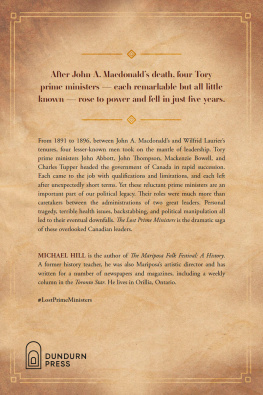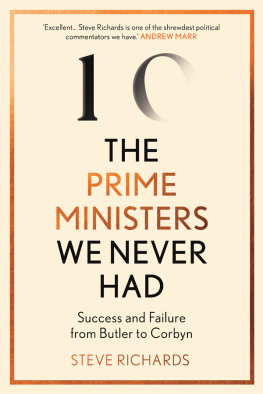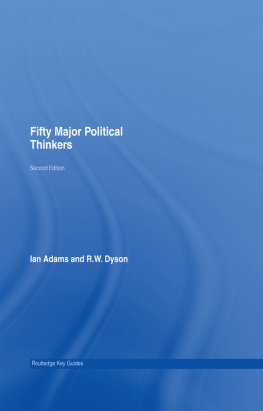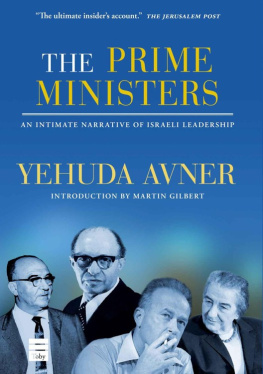by the same author
Birth of the Few
Forewarned is Forearmed
The Golden Book of Remembrance
By Royal Command
Artists and Authors at War
First published in Great Britain in 2003 by
LEO COOPER
an imprint of Pen & Sword Books Ltd
47 Church Street
Barnsley, South Yorkshire, S70 2AS
Copyright 2003 by Henry Buckton
and individual contributors
ISBN 0 85052 907 7
PRINT ISBN: 9780850529074
PDF ISBN: 9781783377602
EPUB ISBN: 9781783379804
PRC ISBN: 9781783379606
A catalogue record for this book
is available from the British Library.
Typeset in 11/13 Sabon by
Phoenix Typesetting, Burley-in-Wharfedale, West Yorkshire.
Printed in England by
CPI UK
CONTENTS
MPs FEATURED
James Callaghan
Peter Smithers
Morgan Morgan-Giles
Patrick Duffy
Reginald Bennett
Edward du Cann
James Wellbeloved
James Davidson
Norman Wylie
John Smith
John Peyton
Anthony Kershaw
Francis Pym
Anthony Royle
Thomas Boardman
Edward Heath
Roy Jenkins
Gordon Campbell
Edwin Leather
John Hill
John Page
Charles Simeons
David Renton
Frederic Bennett
Denis Healey
Ivan Neill
Ronald King Murray
John Osborn
William Wilson
Robert Redmond
Paul Bryan
Clive Bossom
Eric Cockeram
Marcus Worsley
William Deedes
Quintin Hogg
James Ramsden
Philip Goodhart
James Spicer
William Whitelaw
Stephen Hastings
Anthony Meyer
David Gibson-Watt
Douglas Dodds-Parker
Robert Boscawen
James Allason
Oscar Murton
Airey Neave
Esmond Wright
Tony Benn
James Molyneaux
Hector Monro
George Mackie
Colin Turner
Peter Shore
INTRODUCTION
In Britain today the title Politician is given far less respect by the general public than it was in former times. All too often the word is associated with sleaze, or corruption. The reality of this was reflected by the electorates poor turn out at the polling stations during the 2001 general election: quite probably the worst turn out this century. In the minds of many people in Britain today, its no longer a question of which individual should represent them in Parliament, or indeed, which political party, but whether it really matters any more who represents them.
This was not always the case, and there was a long period after the Second World War when our representatives seemed to be pillars of society, often representing the greatness of our nation both at home and on the world stage. When I was at school in the 1970s most children not only knew the name of the Prime Minister, but of all the major players in his cabinet, and in opposition. I wonder how many children today even adults can say the same?
It would be impossible to pinpoint exactly why the world of politics has changed, when politicians are all too often a sad reflection of the society that Britain has become itself. But the great figures that our parents and grandparents once discussed with such vigour and respect had at least one common bond: they had either served in the armed forces during the Second World War or experienced its horrors in some other way. This bond was also shared by most of the voters in their respective constituencies. These men and women had seen politics abused by evil men, who had used their power to inflict some of the cruellest inhumanities the world has ever known.
In war the hero generation of 19391945 did battle to rid the world of the political powers that perpetrated these atrocities. In peace, while as politicians, they sought to make the world safe and free, and to endeavour as best they could to ensure that such wickedness could never happen again on such a grand scale.
In the Royal British Legions Golden Book of Remembrance former Prime Minister Edward Heath perhaps speaks for an entire generation of politicians when he wrote: When I fought across Europe in 1944 and 1945 whilst serving with the Royal Artillery, I witnessed at firsthand the destruction, carnage and misery of modern warfare. Cities across the continent were razed to the ground. Europe had once again destroyed itself. The devastation and despair which surrounded the Allied armies as they made their way across a shattered Europe was to make a tremendous impact on all of us involved. Confronted with such scenes, I became convinced of the deep belief that remains with me to this day: that the peoples of Europe must never again be allowed to fight each other. We can only hope that by remembering all those who made the ultimate sacrifice, future generations may be able to grasp firmly the ideals of peace and reconciliation.
Since Mr Heath wrote those words, Europe has again witnessed scenes of mass murder, segregation and ethnic cleansing. It is noticeable that the resurgence of political regimes with the ability to sustain such evil have only occurred with the diminishing influence of these grand old statesmen, not only in Britain, but throughout Europe.
It would be nave to suggest that politics during the post-war years were without blemish. Naturally there have always been scandals of one sort or another. For instance, in 1963, John Profumo resigned as Harold Macmillans Secretary of War, following his much-publicized affair with Christine Keeler, who was also the mistress of a Russian diplomat, which at the time created a security risk. John Profumo, the MP for Stratford-upon-Avon, had served with the Northamptonshire Yeomanry during the war, reaching the rank of Brigadier; he had also been mentioned in dispatches.
And, of course, British politics during this period had its share of controversial figures, such as Enoch Powell, whose Rivers of Blood speech in 1968 effectively curtailed the career of a potential Prime Minister. When war broke out he enlisted as a private soldier in the Royal Warwickshire Regiment. Commissioned in 1940, he also rose to the rank of Brigadier.
In 1945 there was a general election in Britain, and it was from this point onwards that those who had witnessed the evils of the past six years began to slowly emerge in the House of Commons, and inevitably their collective experiences helped to shape the post-war life of the nation.
Polling Day, 8 July 1945, was the culmination of one of the most unusual campaigns in political history. For nearly six years the nation had been at war. The conflict in Europe had only ended two months earlier, while in the Far East British and Allied troops continued their desperate struggle against Imperial Japan.
On 8 July 1945 the embattled population of Britain, still reeling from the effects of Hitlers revenge weapons, were required to place their mark on a polling slip. Thousands of servicemen arriving home from the European war, or helping to keep the peace on the continent, were asked to elect representatives from a campaign they knew little about, and candidates they knew nothing about. Many of these servicemen were still in a state of shock, thanking God they had been spared and wondering whether their families, homes and friends were safe back in Britain. In the jungles of south-east Asia troops continued to face an unrelenting and savage foe, and the probability of an invasion of mainland Japan. Compared to this, thoughts of a general election at home must have seemed almost insignificant.
Predictably, in retrospect, the population did what they always do after a period of turmoil and hardship they opted for a change. Winston Churchill had been a popular leader, still today the personification of Britains bulldog spirit of defiance. Yet for the populace at the time he represented the past, which they simply wanted to forget.
Sir Paul Bryan, who ended the war as a Lieutenant Colonel in the Royal West Kent Regiment and who became an MP in 1955, says in his autobiography
Next page
